Key takeaways:
- Celebrating small wins and achievements boosts band morale and strengthens team bonds.
- Open communication enhances trust and engagement, fostering a collaborative atmosphere.
- Creating a positive culture through humor, support, and creativity enriches the band’s experience.
- Providing constructive feedback and recognition promotes individual growth and motivates members.
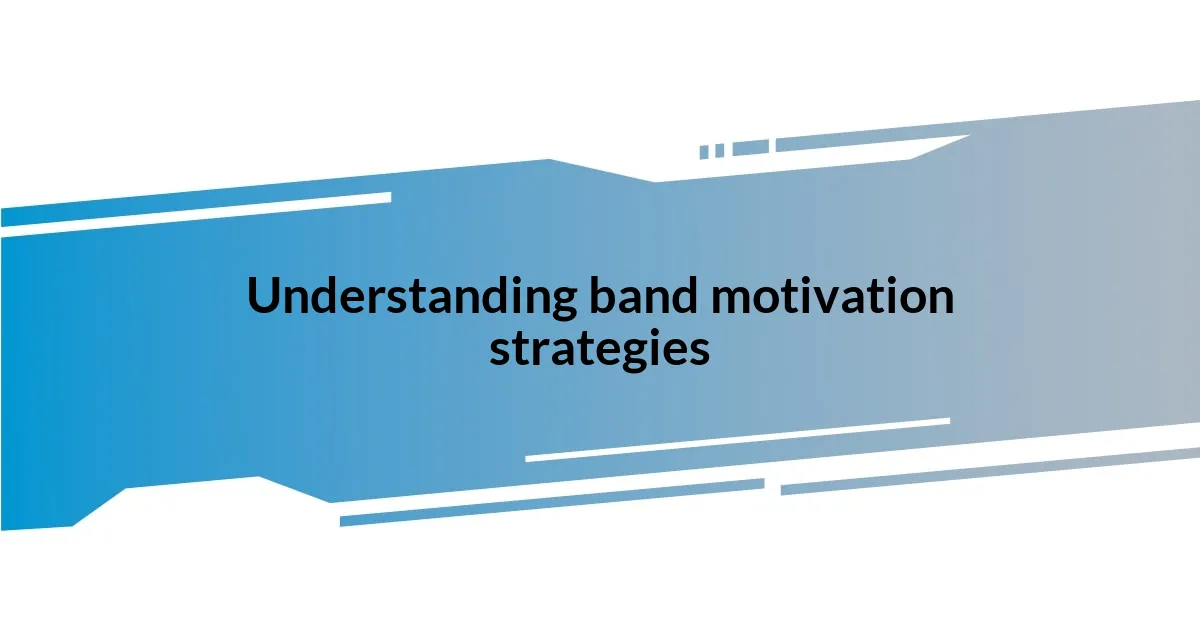
Understanding band motivation strategies
One effective strategy I’ve found in keeping my band motivated is celebrating small wins. I remember the time we nailed a particularly tricky song during rehearsal; the excitement in the room was palpable. I made it a point to pause, acknowledge everyone’s hard work, and even brought out some snacks to mark the occasion. Isn’t it amazing how a little recognition can spark enthusiasm?
Another approach that has proven valuable is fostering open communication. I often ask my band members for their thoughts on our practices and songs. This simple act not only shows that I value their input but also strengthens our bond. Have you ever considered how much a genuine conversation can enhance teamwork?
Additionally, setting shared goals can really unify a group. I once suggested we aim for a local gig that seemed a bit ambitious at first. The thrill of working toward something bigger lit a fire in us all. It’s incredible how collective aspirations can push creativity and drive. How do you keep your team on the same page when pursuing a common dream?
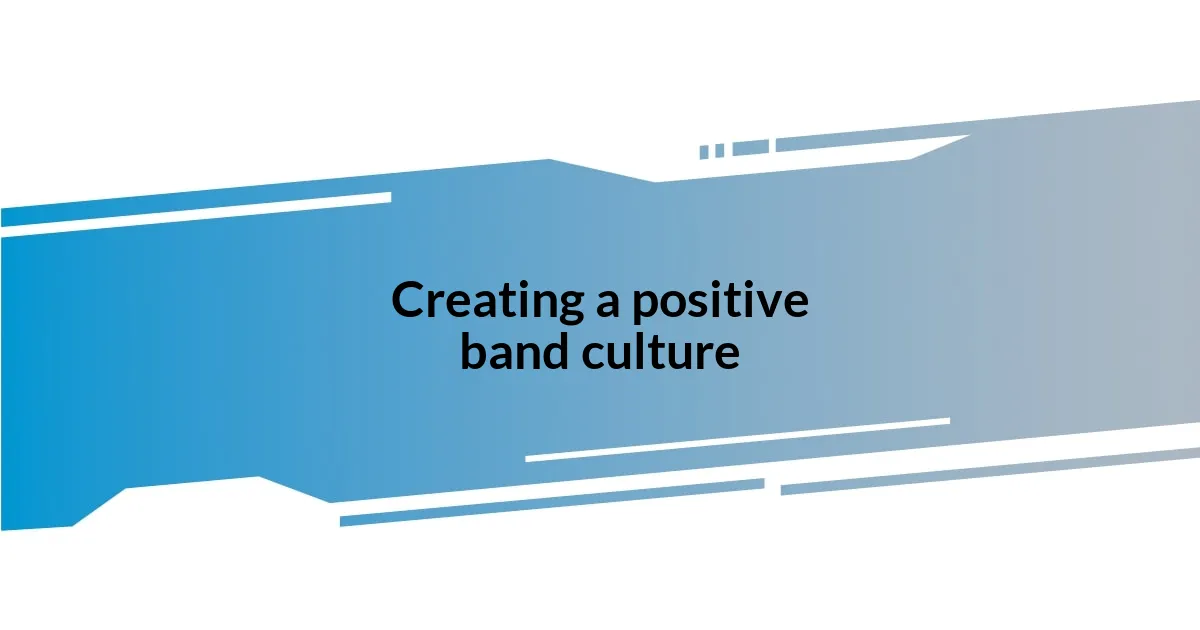
Creating a positive band culture
Creating a positive band culture is crucial for sustained motivation. I’ve seen how humor can lighten the atmosphere during practices. For instance, one day, we had a missed cue that led to spontaneous laughter, and instead of feeling frustrated, we turned it into a running joke. This kind of lightheartedness not only eases tension but also fosters camaraderie among band members.
It’s also essential to cultivate an environment of support. When I had a bandmate who struggled with stage fright, we all rallied around him with encouraging words and practical tips. I remember appointing one member to help him practice comfortable breathing techniques before performances. Witnessing the transformation in my bandmate’s confidence was a beautiful example of how a supportive culture can uplift everyone.
Lastly, I believe in the power of creativity within the band. When we experimented with different styles and genres, the energy was electric. I once suggested a funk track for our next set, which was outside our usual rock comfort zone. Everyone’s enthusiasm skyrocketed, as they relished the chance to explore new avenues. Embracing creativity can be a powerful motivator, pushing each member to contribute their unique flair.
| Aspect of Positive Band Culture | Example from Experience |
|---|---|
| Humor | Lightened the mood during a missed cue, leading to lasting jokes that created bonding. |
| Support | Rallied around a bandmate with stage fright and helped him build confidence. |
| Creativity | Experimenting with funk led to heightened enthusiasm and engagement from all members. |
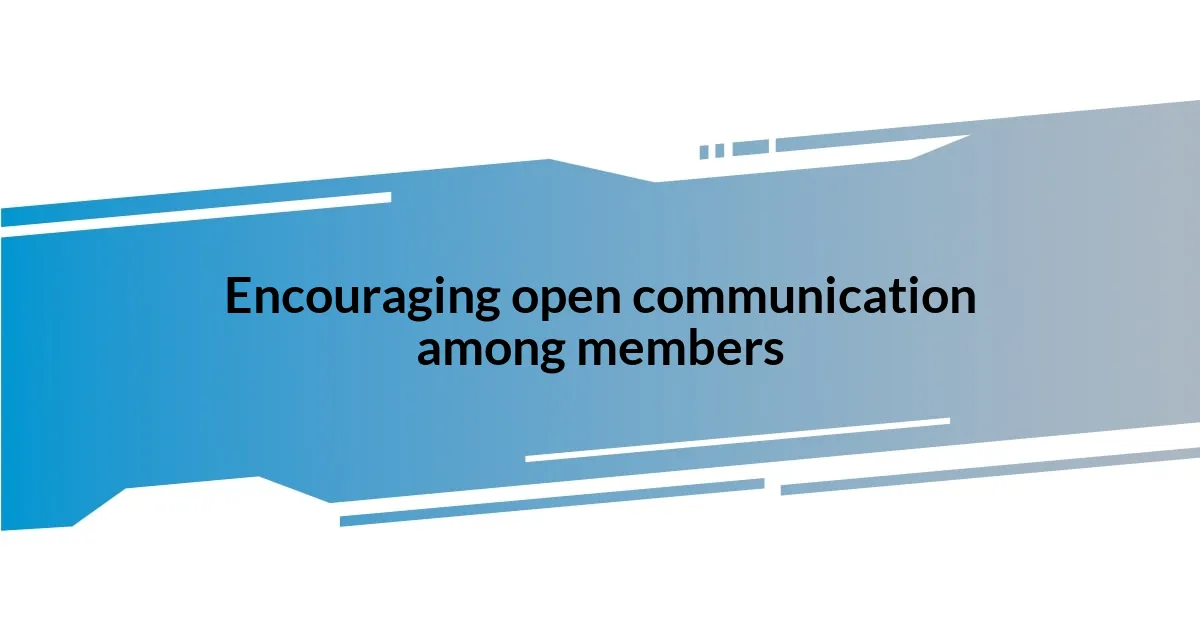
Encouraging open communication among members
Encouraging open communication among band members has been a game-changer for us. I remember a rehearsal when we were struggling with a new song. Instead of pushing through the frustration, I took a moment to ask everyone how they felt about our progress. That simple act opened the floodgates—my bandmates shared their concerns and suggestions, and suddenly, we were all on the same page. I couldn’t believe how quickly the atmosphere shifted; we were no longer just a group of musicians, but a team working together toward a common goal.
To further nurture this openness, I implemented regular check-ins. These quick sessions allow everyone to voice their thoughts without fear of judgment. Here’s how we keep the conversation flowing:
- Anonymous Feedback: I set up a suggestion box where members can share ideas or concerns without attaching their names. It helps shy members feel more comfortable expressing themselves.
- Weekly Roundtables: We dedicate a few minutes at the end of each rehearsal to discuss what went well and what could be improved. It fosters honesty and transparency.
- Active Listening Practices: I encourage everyone to listen attentively when someone speaks. We’ve all been there—feeling unheard can really dampen morale, so I emphasize the importance of validation.
By creating this culture of open communication, I’ve experienced firsthand how it enhances trust and engagement among the band. It makes rehearsal not just about the music, but about us as individuals working together to create something special.
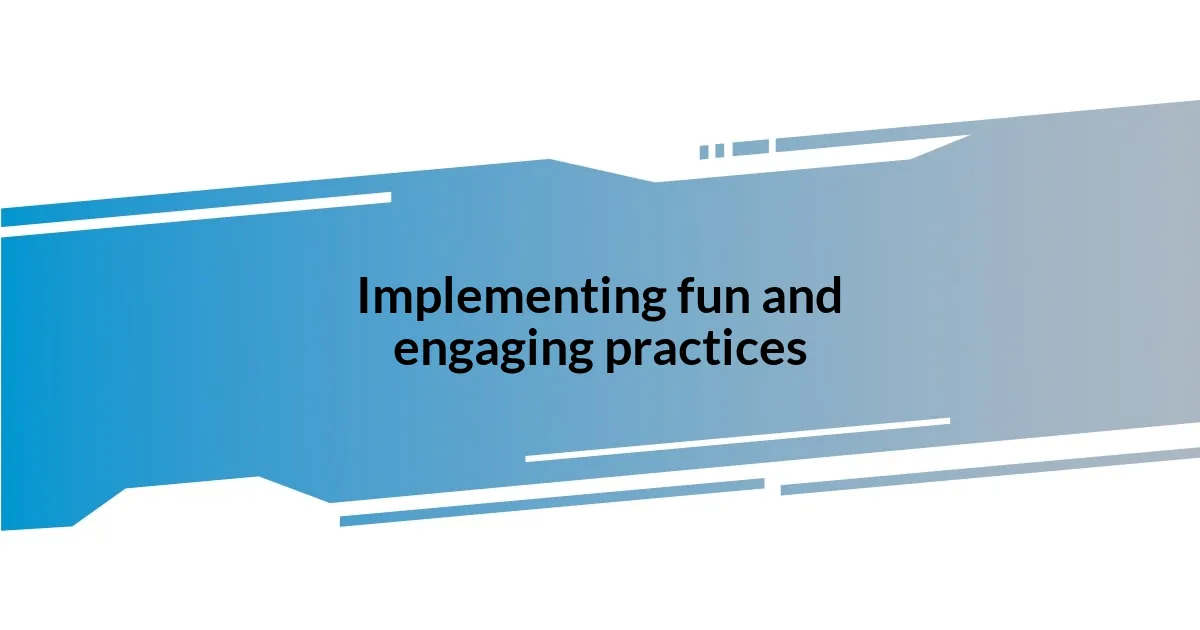
Implementing fun and engaging practices
Implementing fun and engaging practices can drastically change the vibe of a rehearsal. I remember we once planned a surprise “musical games night” after a long week of intense sessions. We split into teams, played music trivia, and even had a talent show—it was refreshing to see everyone’s silly side. When was the last time you laughed with your bandmates over something ridiculous? This not only boosted morale but made us much closer as a team.
Another surprisingly effective practice I introduced was “Theme Rehearsals.” One night, we all wore costumes related to a genre we were exploring. I downright giggled at our drummer’s Elvis impersonation, complete with sunglasses and a sequined jumpsuit. That night, practicing a rockabilly tune felt like a blast from the past. It’s moments like these that remind me how a little creativity and humor can elevate our spirits and reinforce our passion for music.
Furthermore, I initiated improvisation sessions where anyone could suggest a prompt, and we’d create something on the spot. I once suggested a scenario where we were an alien band playing on Mars. The sound we created was so bizarre, yet it sparked endless laughter. It made me realize that engaging in unconventional practices not only sharpens our skills but also strengthens our bond as a band. Who knew that fun could lead to artistic breakthroughs?
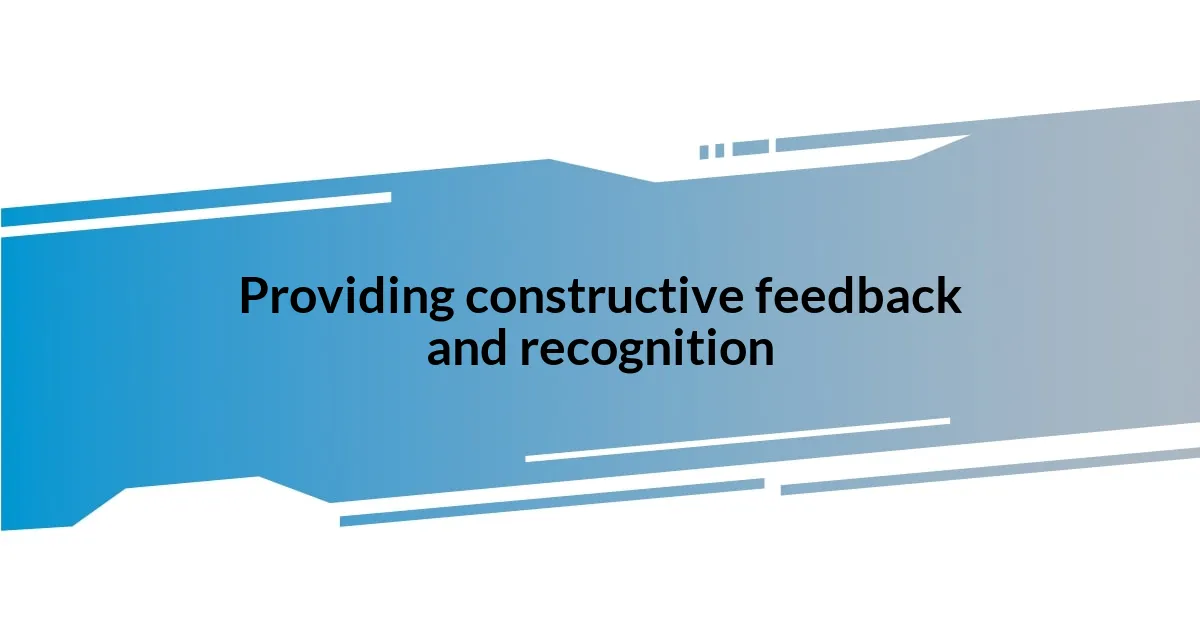
Providing constructive feedback and recognition
Providing constructive feedback and recognition is crucial for band dynamics. I recall a rehearsal where one of our guitarists hit a particularly challenging solo. Instead of generalized praise, I pointed out exactly what I loved about his playing—the way he navigated the shifts in the melody and brought a unique flair. Not only did he light up with that targeted recognition, but it also encouraged him to experiment even more in our future sessions. Have you ever seen how the right words can transform someone’s performance?
I’ve learned that framing feedback positively is key to maintaining motivation. When we need to address a mistake or suggest improvements, I start by highlighting what went well first. Recently, I had to tell our keyboardist that her timing was a bit off in a particular section. By first acknowledging her incredible creativity on the piece, I was able to create a space where she felt supported rather than criticized. It’s amazing how this approach keeps the energy upbeat, don’t you think?
Recognition shouldn’t just come in the moment of reflection; I like to celebrate achievements regularly. At the end of each month, we share “shout-outs” during our team meeting, acknowledging individual contributions—whether it’s nailing a tough section or bringing a killer idea to the table. Recently, I highlighted our drummer’s fantastic rhythm in a new song. Seeing his eyes light up was a reminder of how powerful simple recognition can be. It’s the little things that reinforce our cohesion and remind us why we love creating music together.
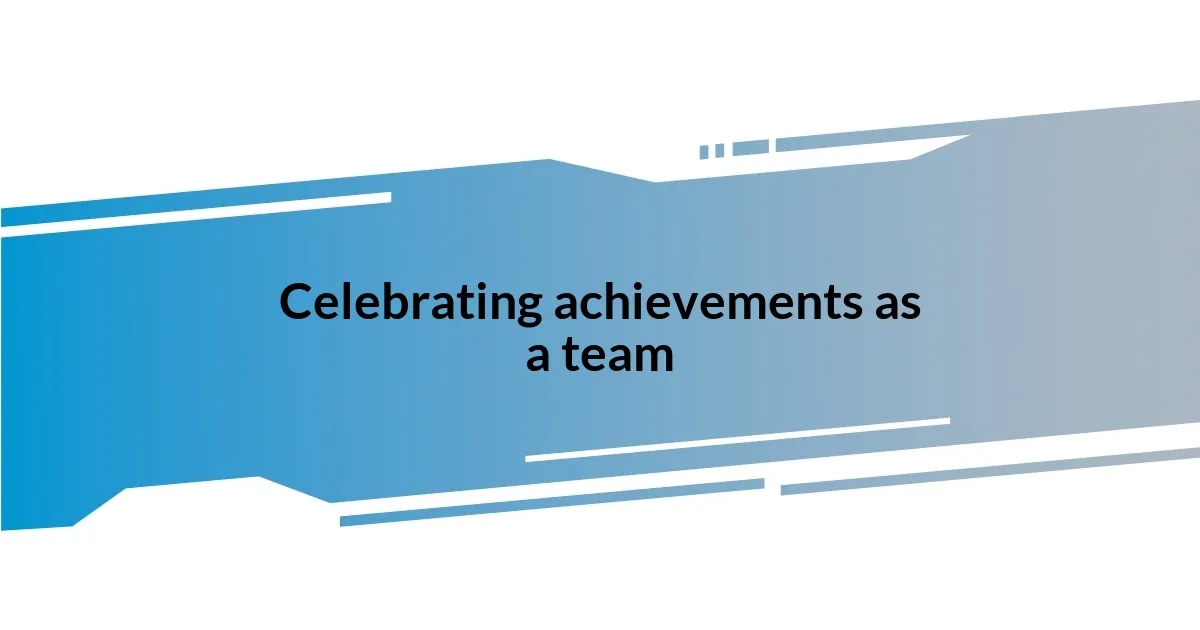
Celebrating achievements as a team
Celebrating achievements as a team is one of the most rewarding aspects of being in a band. I remember one evening when we completed a particularly grueling songwriting session. To commemorate our hard work, I suggested we head out for ice cream together—our treat. Watching everyone dig into their favorite flavors while sharing stories about our creative process filled me with joy. It struck me then how a simple celebration can strengthen bonds and create lasting memories.
I also like to incorporate small rituals when milestones are reached. For instance, after finishing our first EP, we hosted a casual launch party at a friend’s backyard. We set up a cozy space with string lights, performed an acoustic set, and took turns sharing our favorite moments from the process. Looking around at my bandmates, I could see their pride glowing. Isn’t it incredible how acknowledging our journey can deepen our camaraderie?
Lastly, I think about how vital it is to celebrate every little win along the way. One time, after our first gig at a local venue, we ordered pizza to indulge in post-show excitement. I made a toast to our support for each other, reflecting on the exact moment we all felt the rush of performing together. How often do you pause to appreciate those fleeting moments? I’ve realized that these celebrations, no matter how small, weave a rich tapestry of collective memories that keep us inspired and motivated as a team.